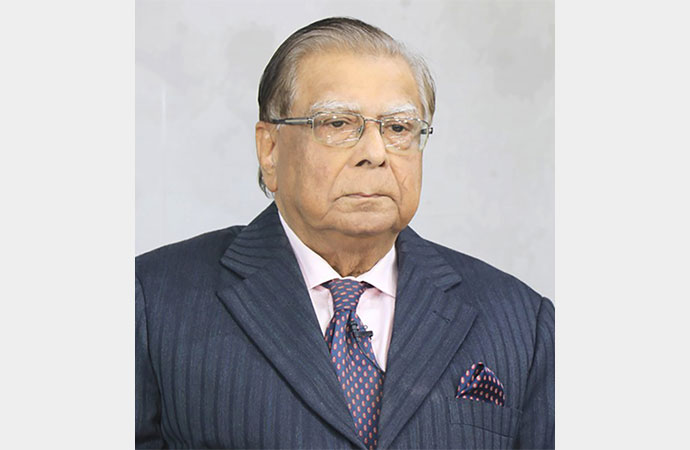Politics

US President Donald Trump. Photo: AP/UNB
Not since World War II has the free world been more uncertain about American leadership. US President Donald Trump’s plan to impose tariffs on allies like Canada and Mexico shows that liberal democracies must prepare to defend themselves against the chaos he seems determined to unleash.
In the final months of his term, former US President Joe Biden repeatedly warned of the growing threat to liberal democracies worldwide and the US-led framework that has underpinned global security, trade, and international cooperation since the 1940s. Donald Trump's actions during the first two weeks of his second presidency, particularly his decision (now paused for 30 days) to impose steep new tariffs on US allies like Canada and Mexico, show that Biden's warnings were not unfounded.
The liberal international order was instrumental in rebuilding a world devastated by World War II, which claimed at least 60 million lives and left many countries in ruins. As the driving Western force behind the defeat of the Axis powers, the United States naturally spearheaded postwar reconstruction.
Most remarkably, the US not only designed the rules of the new world order but also agreed to abide by them. Under America's leadership, institutions like the United Nations and its associated bodies, NATO, and the European Coal and Steel Community (the precursor to the European Union) were established, laying the foundation for decades of global stability and cooperation.
The US was also a founding member of the postwar General Agreement on Tariffs and Trade and its successor, the World Trade Organization. Both were established in response to the economic damage caused by the US Smoot-Hawley Tariff Act of 1930, which triggered a global trade war that exacerbated the Great Depression and fueled the rise of fascism.
To be sure, postwar stability was punctuated by periodic Cold War conflicts like the Vietnam War. But in the end, the US and Western Europe triumphed, leading to the collapse of the Soviet Union and its iron grip on Central and Eastern Europe. In some ways, this period of relative peace resembled the decades of stability that followed the 1814-15 Congress of Vienna, which marked the end of the Napoleonic Wars.
Over the past few years, the postwar order has come under unprecedented pressure, a victim of its own success. After the death of Mao Zedong in 1976, China rejoined the world economy and thrived, capitalizing on the trade liberalization promoted by the US and Europe. Ironically, China's rise was made possible by the very US-led system it now rails against. Could anyone imagine a China-led order allowing a rival to ascend to near-equal status?
In the late twentieth century and early 2000s, China's GDP was doubling roughly every decade. For a time, it seemed as though rapid economic growth would lead to political liberalization. But the Communist Party of China proved unwilling - or unable - to implement meaningful reforms. To maintain its grip on power, particularly over the economy, the CPC under President Xi Jinping reverted to authoritarianism, now with a high-tech twist. China began to flex its geopolitical muscles as well, destabilizing the Asia-Pacific region through aggressive maritime expansion and frequent threats to invade Taiwan.
Meanwhile, following the post-Soviet economic and political turmoil of the 1990s, Russia transformed into a police state under President Vladimir Putin, driven by revanchist nationalism. Defying international law, it invaded Georgia in 2008, seized Crimea in 2014, and launched a full-scale invasion of Ukraine in 2022.
Today, Russia poses a threat not only to its immediate neighbors but also to Western Europe, which, enjoying decades of relative peace, grew complacent and allowed its military defenses to atrophy. Despite the EU's lofty political ambitions, it remains dependent on the US for security.
But while the US was for decades the undisputed and widely trusted leader of Western democracies, the rise of populist nationalism has reshaped its political system, culminating in Trump's takeover of the Republican Party. While Trump has vowed to "make America great again," the reality is that the US never ceased to be great. It remains the world's foremost military and economic power, and is home to its most successful companies. Contrary to some analysts' expectations, its economy has yet to be overtaken by China.
Against this backdrop, Trump's announced tariffs on Canada and Mexico, along with his threats to impose tariffs on other US allies like Denmark, represent a stunning reversal of decades of successful economic policy. Having learned from its protectionist missteps in the 1930s, the US has spent the past few decades championing free trade and reaping enormous benefits. But Trump's tariff drive could set the stage for a destructive global trade war.
Regrettably, Trump's political comeback has turned former critics into fawning sycophants. Among them are America's oligarchs - including Elon Musk, Mark Zuckerberg, and Jeff Bezos - as well as politicians like Vice President J.D. Vance and foreign officials like Peter Mandelson, the United Kingdom's incoming ambassador to the US, who recently called his past criticisms of Trump "ill-judged and wrong."
Despite this collective about-face, it is hard to imagine many citizens of liberal democracies trusting a self-proclaimed leader of the free world who supports democracy only when it serves his personal interests. Such a figure can hardly be trusted to defend Ukraine against Russian aggression, confront China's growing assertiveness, reaffirm America's longstanding commitment to peace between Israel and the Palestinians, or deter Iran from developing nuclear weapons.
Not since WWII has the world been so uncertain about America's leadership. Perhaps most troubling is the growing sense that the US has turned its back on its global responsibilities in favor of an international order where, to quote Thucydides, "the strong do what they can, and the weak suffer what they must."
Like many, I hope that Trump leaves the destructive and vengeful path he is on. I also hope that the UK, the EU, and other liberal democracies recognize the urgent need to stop relying on US security guarantees and take responsibility for their own defense. In Britain, we often speak of our "special relationship" with America. But how can that relationship survive when the US is led by a president who routinely mocks the values that bound us together?
From Project Syndicate

























Leave a Comment
Recent Posts
Pedaling Through the Mangroves ...
The journey from the bustling streets of Barishal to the serene, emera ...
Why the Interim Government mus ...
Two weeks out from what is expected to be a red letter day in the figh ...
Doesn’t matter who thinks what about Bangladesh deci ..
The Other Lenin
US President Donald Trump said his administration
Govt moves to merge BIDA, BEZA, BEPZA, MIDA